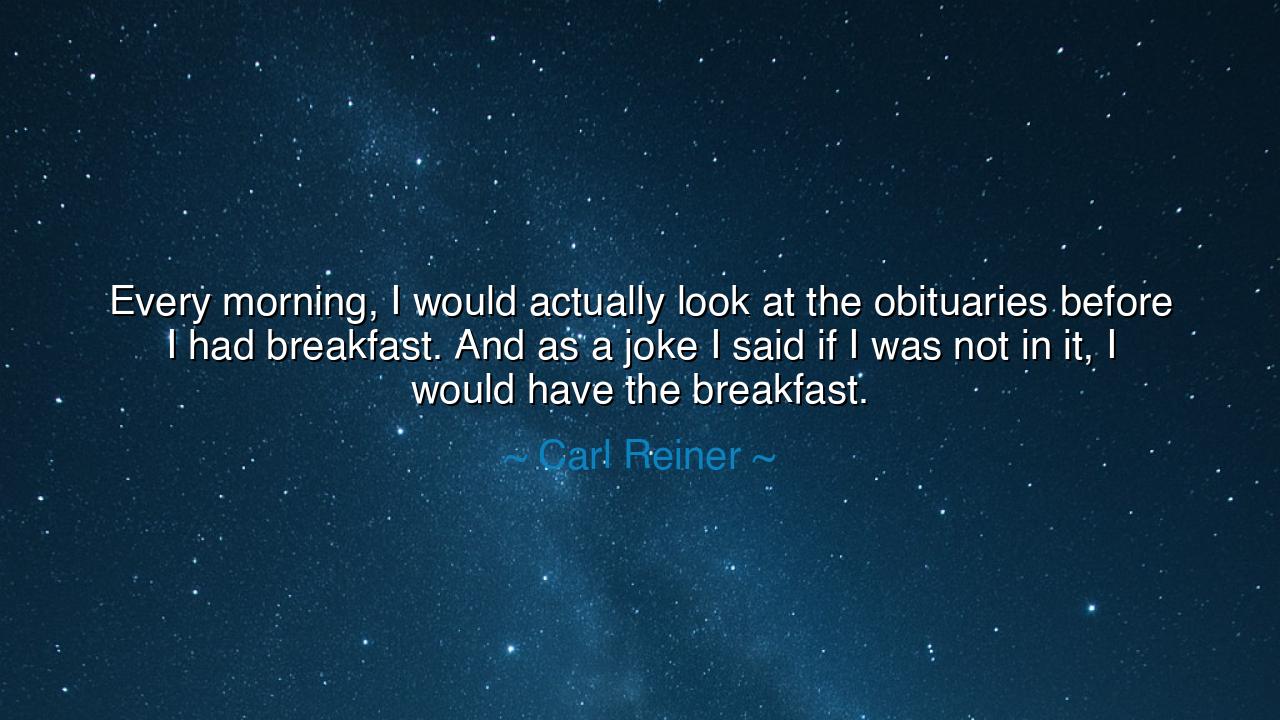
Every morning, I would actually look at the obituaries before I
Every morning, I would actually look at the obituaries before I had breakfast. And as a joke I said if I was not in it, I would have the breakfast.






Hear the jesting wisdom of Carl Reiner, master of humor and truth: “Every morning, I would actually look at the obituaries before I had breakfast. And as a joke I said if I was not in it, I would have the breakfast.” Though clothed in laughter, this statement bears the weight of mortality and the triumph of spirit. It is the kind of truth the ancients cherished—hidden within jest, yet sharper than the sword.
At first glance, the words sparkle with comedy. Reiner, a man of wit, greets the dawn not with worry, but with a glance at the obituaries, as though to say: “Am I still among the living?” And when he finds his name absent, he rewards himself with the small joy of breakfast. Yet within this jest lies a profound acknowledgment of life’s fragility. For he knows, as all wise souls know, that one day his name will appear, and that each day until then is a gift, not to be squandered.
This humor is not a denial of death, but a defiance of it. By laughing at the shadow of the grave, Reiner diminishes its terror. This is an ancient practice. The Stoics of old taught men to meditate upon death daily, not to despair, but to live more fully. Memento mori, they said: “Remember, you must die.” Reiner’s jest is a modern echo of that same truth. The difference is only in tone—the Stoic sat with solemn meditation, while the comedian chose laughter. Both paths, however, lead to the same wisdom: to cherish the day given.
Consider the story of Marcus Aurelius, the Roman emperor and philosopher. Each morning he reminded himself that he could die at any hour, and so he should not waste time in anger, vanity, or trivial pursuits. For him, this awareness was not morbid but liberating. He ruled wisely because he lived with death as his constant teacher. Reiner, in his way, follows the same tradition. By checking the obituaries, he reminds himself daily of life’s brevity—and by joking about it, he seizes joy in the face of fate.
The meaning is clear: to live well, one must not deny death but live with it at one’s shoulder. The one who fears it shrinks from life; the one who acknowledges it lives more fiercely. Every morning becomes a victory, every meal a celebration, every laugh a triumph over silence. Reiner’s humor carries a hidden heroism: he teaches us to meet mortality not with trembling, but with a smile.
The lesson for us is this: awaken each day with gratitude that your name is not yet written in the ledger of the departed. Do not waste the hours in bitterness or in waiting for perfect moments. Live them, as they come—eat your breakfast, laugh with friends, labor with purpose, and love without delay. For one day the obituaries will bear your name, but until then, you have the power to live as though every sunrise is a gift.
As practical action, cultivate a morning ritual that reminds you of life’s impermanence and life’s joy together. Write down one thing you are grateful for upon waking. Smile, even if forced, and honor the fact that you still draw breath. Take your meals not as habit, but as celebration. And when hardship comes, recall Reiner’s wisdom: “If I am not in the obituaries today, I will eat and rejoice.” In this spirit, every day becomes a triumph over the grave.
Thus, the elder comedian becomes a sage. For though laughter is his medium, truth is his message: life is short, death is certain, and joy is a choice. To live with this knowledge is to live fully, as the ancients desired, with courage in the face of darkness and gratitude in the light of each dawn.






AAdministratorAdministrator
Welcome, honored guests. Please leave a comment, we will respond soon